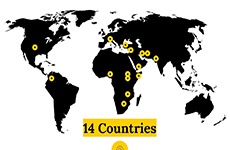The beauty of the course this year was that those who had experience in the field could work with those who didn’t—it created a wonderful mix.”
Mija-Tesse Ververs Senior associate in the Department of International Health
In early January 2020, as Gilbert Burnham and Mija-Tesse Ververs wrapped up the 34th bi-annual Health Emergencies in Large Populations (HELP) course, they were growing more concerned about the COVID-19 news coming out of Wuhan, China. All signs pointed to an imminent global public health emergency declaration from the WHO, which meant holding HELP #35 in July would be a no-go. “And so, very glibly, and in a moment of weakness perhaps, we said ‘Oh, well, we’ll do it virtually,’ and in retrospect I’m not really sure we thought that through,” Burnham said with a laugh.

Weakness or not, on January 4, 2021, they opened the 35th HELP course on Zoom. Two weeks later, as everyone tuned in for a virtual “last class” celebration, 44 students in 14 countries spread across 13 time zones declared it a complete success. “It really went off well,” Burnham added wryly, “with a minimal amount of difficulties.”
A key contributor to this success is HELP’s longstanding external champion—the Capital Group Companies Foundation, which has provided the School with annual course support for nearly 30 years. When Dean Emeritus Al Sommer first met with foundation officials in 1995, they were attracted to HELP’s distinctive curriculum, which filled a critical gap in providing humanitarian health education, especially for those in the field. The annual funding has been used exclusively for scholarships, particularly for students from disaster-afflicted areas around the world who simply were not able to enroll or who could not afford both course fees and travel costs. The collaboration has evolved over the years to support several other School initiatives, including partial funding for a recent Johns Hopkins Alliance for a Healthier World Launchpad Grant that supports research on mental health disparities amid the COVID-19 pandemic.
The beauty of the course this year was that those who had experience in the field could work with those who didn’t—it created a wonderful mix.”
Mija-Tesse Ververs Senior associate in the Department of International Health
In terms of student participation, the eHELP course has been a pandemic silver lining. Students working in health emergency locations who were previously unable to make the trip could attend and participate fully, including, for the first time, students who had previously been barred by visa restrictions. As Colombian disaster public health physician Francisco José Sarmiento shared, “attending the course was a dream come true,” particularly as he pursues his doctorate in disaster science and management. “The beauty of the course this year was that those who had experience in the field could work with those who didn’t—it created a wonderful mix,” Ververs commented.
As students and faculty alike celebrated the close of this latest, most unusual session, its success underlines the transformative nature of long-term investment in public health. Consistent support from the Capital Group Companies Foundation helped the team leverage its expertise and a deep library of assets to create a robust virtual offering for students that improved on the original. Burnham and Ververs consider the foundation a “true partner” in HELP’s crucial mission of providing the best possible training for humanitarian health workers, in the face of COVID and whatever challenges may follow.
Learn more about the 35th HELP course at the Johns Hopkins School of Public Health.
Topics: Foundations, Bloomberg School of Public Health, Promote and Protect Health, Support Scholars